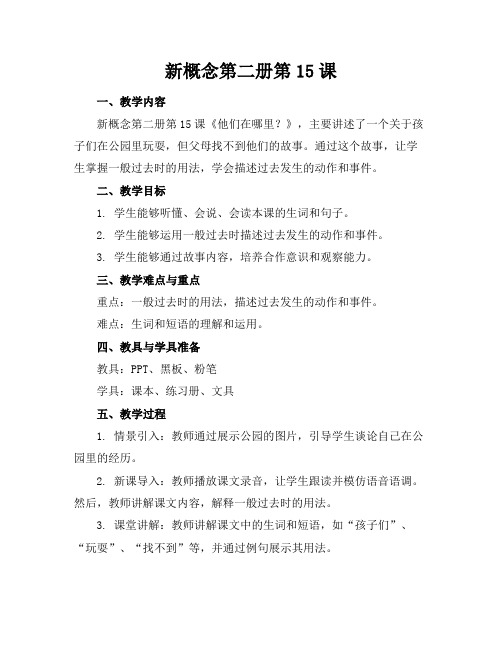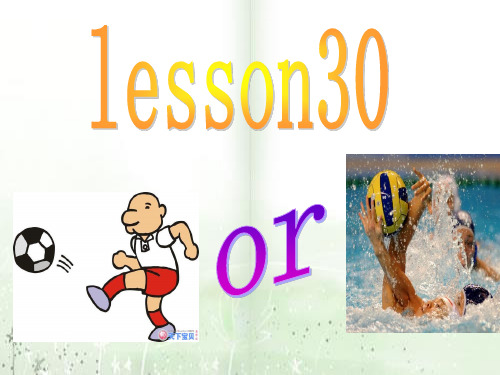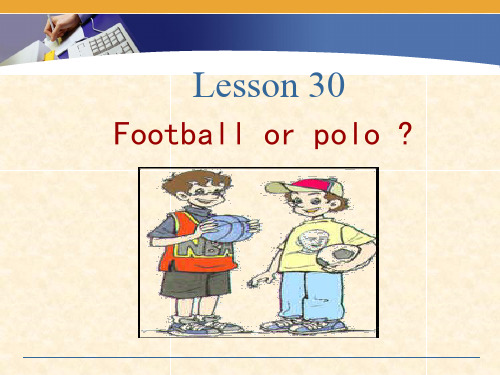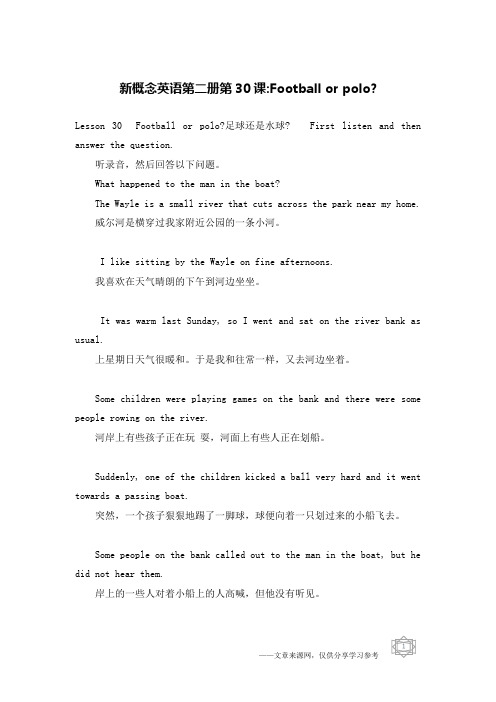新概念英语复习课15课30课
新概念第二册第15课

新概念第二册第15课一、教学内容新概念第二册第15课《他们在哪里?》,主要讲述了一个关于孩子们在公园里玩耍,但父母找不到他们的故事。
通过这个故事,让学生掌握一般过去时的用法,学会描述过去发生的动作和事件。
二、教学目标1. 学生能够听懂、会说、会读本课的生词和句子。
2. 学生能够运用一般过去时描述过去发生的动作和事件。
3. 学生能够通过故事内容,培养合作意识和观察能力。
三、教学难点与重点重点:一般过去时的用法,描述过去发生的动作和事件。
难点:生词和短语的理解和运用。
四、教具与学具准备教具:PPT、黑板、粉笔学具:课本、练习册、文具五、教学过程1. 情景引入:教师通过展示公园的图片,引导学生谈论自己在公园里的经历。
2. 新课导入:教师播放课文录音,让学生跟读并模仿语音语调。
然后,教师讲解课文内容,解释一般过去时的用法。
3. 课堂讲解:教师讲解课文中的生词和短语,如“孩子们”、“玩耍”、“找不到”等,并通过例句展示其用法。
4. 实践环节:教师组织学生进行角色扮演,模拟故事中的情景,让学生运用一般过去时描述动作和事件。
5. 随堂练习:教师发放练习册,让学生完成相关的练习题,巩固所学知识。
7. 作业布置:教师布置作业,让学生运用一般过去时写一篇小作文。
六、板书设计黑板上写出一句话:“他们在哪里?”然后,教师通过板书,将句子变成一般过去时的形式:“他们在哪里?”七、作业设计1. 作业题目:请用一般过去时写一篇关于你在公园里玩耍的小作文。
2. 作业答案:(示例)昨天,我和我的朋友们一起去公园玩耍。
我们跑了很长时间,玩得非常开心。
但是,当我们想找我们的父母时,我们发现他们不见了。
我们到处找他们,但找不到。
我们决定去附近的餐馆找他们,因为他们说要给我们买冰淇淋。
当我们到达餐馆时,我们终于找到了他们。
他们都坐在那里等着我们,我们非常高兴。
八、课后反思及拓展延伸本节课通过一个有趣的故事,让学生掌握了一般过去时的用法。
新概念英语第二册课件ppt第30课Lesson30

The Wayle is a small river that cuts across the park near my home. I like sitting by the Wayle on fine afternoons. It was warm last Sunday, so I went and sat on the river bank as usual.
一些人在做计划,一些人在闲聊。突然一个人关门如 此的用力以致每个人都看着他。
Some were making plans and there were some people chatting. suddenly, one man closed the door so hard that everyone looked at him.
Some children were playing games on the bank and there were some people rowing on the river. Suddenly, one of the children kicked a ball very hard and it went towards a passing boat.
Can you row me across the river?
kick
Kick the habit Kick the bucket Kickback
I get a kickback of 2000 Yuan.
sight
catch sight of… Out of sight, out of mind long sighted short sighted
but she did not hear him.
新概念英语第三册课堂笔记:第30课

Lesson 30 The death of a ghostFor years, villagers believed that Endley Farm was haunted. The farm was owned by two brothers, Joe and Bob Cox. They employed a few farmhands, but no one was willing to work there long. Every time a worker gave up his job, he told the same story经历. Farm labourers said that they always woke up to find that work had been done overnight. Hay had been cut and cowsheds had been cleaned. A farm worker, who stayed up all night, claimed to have seen a figure⼈ cutting corn in the moonlight. In time, it became an accepted fact that the Cox brothers employed a conscientious ghost that did most of their work for them.No one suspected认为是 that there might be someone else on the farm who had never been seen. This was indeed the case.A short time ago, villagers were astonished to learn that the ghost of Endley had died. Everyone went to the funeral, for the ‘ghost’ was none other than正是 Eric Cox, a third brother who was supposed to have died as a young man. After the funeral, Joe and Bob revealed a secret which they had kept for over fifty years.Eric had been the eldest son of the family, very much older than his two brothers. He had been obliged to join the army during the Second World War. As he hated army life, he decided to desert his regiment. When he learnt that he would be sent abroad, he returned to the farm and his father hid him until the end of the war. Fearing the authorities, Eric remained in hiding after the war as well. His father told everybody that Eric had been killed in action. The only other people who knew the secret were Joe and Bob. They did not even tell their wives. When their father died, they thought it their duty to keep Eric in hiding. All these years, Eric had lived as a recluse. He used to过去常常 sleep during the day and work at night, quite unaware of the fact that he had become the ghost of Endley. When he died, however, his borthers found it impossible to keep the secret any longer.New word and expressionslabourer 劳动者overnight ⼀夜间hay ⼲*corn ⾕物moonlight ⽉光conscientious 尽职尽责的认真的suspect 怀疑是desert 开⼩差regiment 团(军队)action 战⽃recluse 隐⼠Notes on the textl peasant(职业)农民├farmer农夫(农场中劳动)├labourer⼯者(⽆固定职业)└farm hands农场帮⼿l overnight(不⼀定⼀晚)⼀夜(成名)The singer rose to fame overnight.┌corn⽟⽶,⾕物└barn仓库(corn被buy回来)My girlfriend and I swam in the moonlight.l conscious意识的└conscientious勤劳的be conscious of意识到l sceptical adj.充满怀疑的├doubt v.对…表⽰怀疑(不相信)└suspect怀疑是(This is fact)suspect疑犯This is a sceptical age.There is no doubt,不⽤怀疑I suspect that…l desert the army军中开⼩差His villa is haunted.(别墅)闹⿁,萦绕 /Rn/His smiles still haunt my mind / memory / imagination.No one was willing to work there long.l one more time再来⼀下├each time每次├every time每⼀次├once(过去时)曾经├at one time曾⼏何时├yet another time⼜⼀次├for a second time⼜⼀次├once again再⼀次└time and time again⼀次次I’m far from smoking.决不Smoking is the last thing I will do.(最不可能)决不做的事I have given up smoking.It’s the same old story.那是⽼调重谈It’s a long story.说来话长stay up all night⼀夜未睡= white nightclaim to have done宣称做过…a perfect figure⾝材很美l In time, 放句⾸译“⼀时间,最后”放中间表“及时”└With time, 随着时间推移suspect以为,认为是This was indeed the case.情况确实如此a short time age不久以前l 否定词组肯定含义├nothing but仅仅,只├none other than正是└no more than仅仅,不过He’s none other than Mr.Wang.He knows nothing beyond English.只知道…(=but)l brigade旅└regiment团┌fight打架├action⼩规模战⽃├battle战役├war战争├raid袭击├attack袭击├assault打⼥的└=attack insult污辱Fearing my teacher, I dare not go to school.害怕…⽽不敢…remain in hiding保持着藏He died in poverty.死于(静态)He was killed in action.I think it my duty to protect the weak.责任,弱者┌All these years这些年来└For years, 数年l be anxious to do├be afraid of├be aware of└be unaware of没有意识到The young man works very hard, unaware of his bad health.把be去掉放句⾸做状语,后接名词或that从句find it impossible to do发现不可能l 经典⼝语习语1. take one’s breath away太让⼈吃惊了2. What’s all about? 怎么了?3. That’s really something.真棒4. be on edge(边缘)紧张5. be chilled to the bone冻死啦I’m frozen.6. It came to nothing.不了了之7. He is dead to the world.熟睡pig-headed猪脑⼦Exercises*It never occurred to sb. that超级句型“某⼈从来没有想到…”1. Farm labourers said that on waking up they would find work had been done.*on doing…, someone would do / will do表⽰“某⼈⼀⼲某事就常常会⼲…”2. – employed a conscientious ghost, which did most of their work for them.*which did在句中做⾮限制性定语从句3. As he hated life in the army, he decided to desert…*“军队的⽣活”应理解为“在军队⾥的⽣活”life in the army⽽不是life of the army4. – Eric had been killed while fighting with his regiment.*while后可跟v-ing形式*during后可能跟名词,通常与in换⽤:during / in the holiday5. Joe and Bob were the only other people who knew the secret and did not even tell their wives. *主⼲是Joe … were…and did…6. With time, it became an accepted fact…*with time常⽤于句⾸,表⽰“最后,⼀时间”*at the time当时*on time准时7. He was cons cripted during the Second World War.*recruit仅指招募军队、⼈员等,有时可以⾮法招募*cons cript正式⽤语,表⽰根据法律或宪法征兵,公对本国公民⽽⾔8. All these years, Eric had lived the life of a hermit.*the life of a hermit隐⼠般的⽣活9. He used to work at night, never realizing that he had become the ghost of Endley.*原⽂中的be unaware of表⽰“没意识到,意识不到”,意思与never realize相同*ignore (pay no attention to)表⽰忽视,也表⽰故意不注意“⽆视,不理睬”。
新概念第二册第15课课件

英国文化有着深厚的传统,注重礼仪 、礼貌和社会等级。英国人通常以保 守和矜持著称,但也拥有独特的幽默 感和下午茶文化。
课文中的文化点解释
美式幽默
课文中出现的幽默表达方式,如双关语和俏皮话,反映了美式幽默的特点,即轻松、机 智和实用。
英国俚语
课文中出现的英国俚语,如“knock it off”意为“停止做某事”,需要解释其特殊含 义和用法。
04
口语训练
跟读课文
总结词
提高语音语调
详细描述
通过模仿课文的语音语调,学生可以纠正自己的发音,培养正确的语感,并熟悉 英语的节奏和语调。
情景对话
总结词
增强实际交流能力
详细描述
设置与课文内容相关的实际生活场景,让学生进行角色扮演,模拟真实对话情景,有助于学生更好地 理解和运用英语表达,提高口语交际能力。
课文翻译
01
02
03
中文翻译
提供课文的中文翻译,帮 助学员更好地理解课文内 容。
英文原文
提供课文的英文原文,方 便学员对照学习。
重点难点解析
对课文中的重点和难点进 行解析,帮助学员更好地 掌握知识点。
02
练习题
选择题
选择题1: 下列哪个 词组的用法是正确的 ?
B. He is reading a book in the ary.
跨文化交际技巧
尊重文化差异
在与不同文化背景的人交流时,要尊重 他们的文化习俗和价值观,避免冒犯或 误解。
VS
有效沟通
了解不同文化的沟通方式和礼仪,使用适 当的语言和非语言符号进行交流,以达到 有效沟通的目的。
THANKS
感谢您的观看
A. I am writing a letter to my friend.
新概念英语第二册第30课(共49张)PPT课件

在方位词 前加the
The + 单数名 词表类 别
Grammar in use
5
6
7
8
专用 名词 加 the
乐器 前面 加 the
独一无 二的 事物 加 the
在序数 词或最 高级前 加 the
Grammar in use
9
10
姓氏复 数前加 the 表 示一家 人
年代 名词 前加 the
11
12
New words and Expressions
② vt. 割破,划破 cut oneself 割伤自己 ③vi. 横穿,穿越(介词用across/through) cut across/through 直着穿过 The road cuts across/through the forest. cut a corner 走捷径,超近路 When you learn English, never cut a corner. No pains, no gains. 没有付出,就没有收获。
B
2. I was just talking to Margeret when Jackson ____. A. cut in B. cut down C. cut out D. cut up
A
New words and expressions
2. row ① v. 划船 My brother is rowing. 划船 (row 强调动作) go boating 去划船(强调玩) ② n.排 We are in the same row. 我们在同一排。
Company Logo
Practice
❖She’s been out for nights in a ___.
新概念英语第二册第30课-Football or polo-

新概念英语第二册第30课:Football or polo?Lesson 30 Football or polo?足球还是水球? First listen and then answer the question.听录音,然后回答以下问题。
What happened to the man in the boat?The Wayle is a small river that cuts across the park near my home.威尔河是横穿过我家附近公园的一条小河。
I like sitting by the Wayle on fine afternoons.我喜欢在天气晴朗的下午到河边坐坐。
It was warm last Sunday, so I went and sat on the river bank as usual.上星期日天气很暖和。
于是我和往常一样,又去河边坐着。
Some children were playing games on the bank and there were some people rowing on the river.河岸上有些孩子正在玩耍,河面上有些人正在划船。
Suddenly, one of the children kicked a ball very hard and it went towards a passing boat.突然,一个孩子狠狠地踢了一脚球,球便向着一只划过来的小船飞去。
Some people on the bank called out to the man in the boat, but he did not hear them.岸上的一些人对着小船上的人高喊,但他没有听见。
The ball struck him so hard that he nearly fell into the water.球重重地打在他身上,使他差点儿落入水中。
新概念英语第二册:第30课课文详解及语法解析.doc

新概念英语第二册:第30课课文详解及语法解析课文详注 Further notes on the text1.The Wayle is a small river that cuts across the park near my home. 威尔河是横穿过我家附近公园的一条小河。
在这句话中,that引导的定语从句修饰 a small river,关系代词that在从句中作主语。
地点状语 near my home修饰 thepark。
2.I like sitting by the Wayle on fine afternoons. 我喜欢在天气晴朗的下午到河边坐坐。
(1)by在此处表示“在……旁边/近旁”。
(2)afternoon为复数形式,表示经常性的情况,所以谓语为一般现在时。
因为afternoon前面有修饰词,所以要用介词on。
morning,evening与它的用法一致。
试比较:He came to the office in the afternoon.他下午去了办公室。
He met John on Sunday/on a fine afternoon.他在星期天/在一个晴朗的下午遇见了约翰。
Will you come to the meeting this/tomorrow afternoon?你来参加今天/明天下午的会吗?(在this ,tomorrowr ,yesterday等前面不加介词)This happend on the afternoon of May22.这事发生于5月22日下午。
(请注意在the afternoon of May22之前要用介词on)3.…it went towards a passing boat.……球便向着一只划过来的小船飞去。
(1)go在此处不是指人“走”,而是指球“行进”。
(2)passing为现在分词,作定语,表示“经过的”、“划过来的”,如a passing plane(一架飞过的飞机)。
[全]新概念英语第三册 第30课 语法课文词句全析全解
![[全]新概念英语第三册 第30课 语法课文词句全析全解](https://img.taocdn.com/s3/m/827ffb499e314332396893cb.png)
新概念英语第三册第30课语法课文词句全析全解第一段,第二段《新概念英语》第三册Lesson 30 课文第一段,第二段新概念英语第三册第30课语法课文词句全析全解(五)主要精读详解Lesson 30第三段第一、二、三句词汇句型语法解析及翻译。
《新概念英语》第三册Lesson 30 课文第3段1. 第三段词汇句型语法解析及翻译第①句①Eric had been the eldest son of the family(very much older than his two brothers).埃里克是这家长子, 年龄比他的两个弟弟大得多。
核心词汇解析eldest的用法⑴eldest 是old 的最高级形式之一[用于名词之前,before noun,指某一家庭中3个或3个以上的兄弟姐妹成员里年龄最大的being the oldest of three or more people, especially within a family.Her eldest child is nearly 34, but he hasn't been married yet.她最大的孩子快34岁了,但是他至今还没有结婚。
⑵eldest,作名词noun [S]eldest1 the eldest,a person who is the oldest of three of more people(3个或3个以上的人中)年龄最大的人He was the eldest of four kids.4个孩子中他是老大。
⑶eldest n.作名词the oldest child in a family长子;长女My eldest is at college.我的大孩子正在上大学。
2. 第三段词汇句型语法解析及翻译第②句② He had been obliged to join the army during the first World War.(大儿子埃里克)年龄比他两个弟弟大很多,第一次世界大战期间被迫参军。
- 1、下载文档前请自行甄别文档内容的完整性,平台不提供额外的编辑、内容补充、找答案等附加服务。
- 2、"仅部分预览"的文档,不可在线预览部分如存在完整性等问题,可反馈申请退款(可完整预览的文档不适用该条件!)。
- 3、如文档侵犯您的权益,请联系客服反馈,我们会尽快为您处理(人工客服工作时间:9:00-18:30)。
▪ 在本句中尽管有钢笔、书和铅笔,但 是由于离be动词最近的一项是单数a pen, 因此,be动词用单数is。
▪ There be句型的否定和疑问
▪ There be句型的疑问句是把题目中具 体的be动词形式提前,否定是在be动词后 加not。但是一般后面的名词前有a或any, 那么此时not any或not a可以转化为no。
▪ 定义:不能用个数计量的名词。通常是表物质材 料或抽象概念的名词。如:空气、木材、水、米、
肉、牛奶、茶叶、咖啡、新闻、信息等。
▪ 不可数名词前面不能有a/an/数词
▪ 若要量化不可数名词,需在前面加上量词。如: a/two….+bottle(s) / glass(es) /bar(s) /piece(s)+
用形容词,描述we they you
宾格
▪ 接在动词的后面,是动作的承受站着 ▪ Give me/him/her/us/them ▪ 给她一本书 ▪ 给我一杯水 ▪ 给他们一个箱子
变复数
one
▪ 充当代词,代替前面的名词
▪ There be句型与have的区别
▪ 首先,从含义上说,There be表达的是“某 地有某物”。
▪ c. 辅音字母+y结尾:y ies
▪ d. 以f或fe结尾的单词:f/fe ves
▪ e. 以o结尾的单词: “黑人英雄爱吃土豆蚊子西红柿”+es
Negro,hero, potato,mosquito, tomato [mə'ski:təu]
f. 不规则变化:
不可数名词
▪ 名词
可数名词
不可数名词
▪ 如,There is a tree in front of the house。房 子前有一棵树。
▪ 而have讲的是“某人/某物拥有……”即指出 的是宾语的所有者。
▪ 如:I have an interesting book。我有一本有 趣的书。
▪ The chair has three legs。这把椅子有三条 腿。
练习
▪ 地上有一个盒子 ▪ box on the floor ▪ 盘子上有一把刀子 ▪ plate knife ▪ 杯子里有一把勺子 ▪ cup spoon ▪ 冰箱里有一个瓶子 ▪ bottle refrigeratow
上则是复数
名词的数(Lesson 15)
▪ 名词复数:表示两个或两个以上可数名词, 名词要用复数形式。
▪ 单数:a/an+名词原形
▪ 复数:数字+名词复数形式
注意事项:
▪ 1. 主语为复数,“be” “are”
▪ 2. 只有名词、且为可数名词才有复数形式。
▪ 3. 名词复数形式的变化规则:
▪ a. 一般规则:+s ▪ b. z,x,s,ch,sh结尾单词:+es
人称和单复数的变换
dress box Watch dish
练习
Man Woman Housewife knife
形容词adj.(Lesson10)
▪ 结构:S.+“be”+adj. ▪ 作用:修饰主语
He is cool.
She is ugly.
It is thin.
It is fat.
He is funny.
▪ 一般There be句型直接置于句首,而have前 面要有主语。这是因为There be句型是一个倒装 句型,主语在be动词后。
▪ There be句型的就近原则
▪ There be句型的就近原则也是主谓一 致语法项目的重点考点。There be句型中 be动词的单复数形式由后面挨近的一项的 单复数决定。
新概念英语复习课
L15-L30
国家 Swiss Norway Denmark Russia Holland
国别
国家的(形容词) 人民
Swedish
Swedish
Norwegian
Norwegian
Danish
Danish
Russian
Russian
Dutch
Dutch
单数到复数
▪ 第15可第一次出现了复数的概念 ▪ 英文里,一个物品是单数,两个或两个以
▪ 如: There isn’t a book in the bag.=There is no book in the bag。
▪
There be
物品
地点状语 介词短语
refrigerator electric cooker table bottle cup
In the kitchen In the middle of the room On the table
of
▪ 不可数名词一律看成单数(有量词量化除外)
ห้องสมุดไป่ตู้
▪ A bottle of water ▪ Two pieces of news ▪ Three tons of wood ▪ A tin of tea ▪ 5 tins of tea
There is some water in the cup.
There are two cups of water on the desk.
He is tired.
She is beautiful.
▪ What is the matter? ▪ Are you all right now? ▪ We are tired and thirsty.
They are clean dirty hot shut
Are they?
复数代词+形容词
名词变复数的发音规则
▪ P32
第一次与人见面
▪ How do you do?
▪ The woman is very hardworking. ▪ Those women are very hardworking. ▪ What is your job? ▪ What are your jobs?
指示代词
单数 复数 这 this these 那 that those
人称代词
I
you
He/she/it
we
you
they
练习 变复数
▪ This is your case. ▪ He is a teacher ▪ That is an apple. ▪ She is a tourist. ▪ It is a white shirt. ▪ It is an orange tie.
